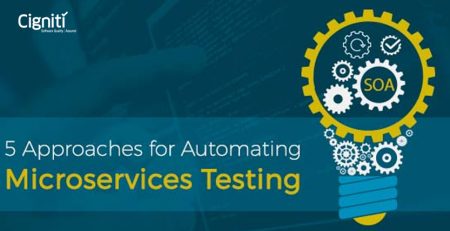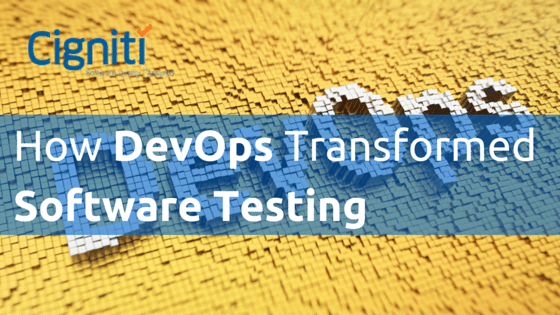How Can DevOps Readiness Revitalize Business Transformation?
From identifying patterns to uncovering new revenue streams, DevOps plays an imperative role in revitalizing business transformation.
According to Gartner, “The most successful organizations know the business benefits they hope to realize from DevOps”.
Before initiating a formal DevOps implementation, it is important for CIOs to understand the indicators for enterprises to know if they are ready to undertake a DevOps initiative.
It is proven that DevOps initiatives drive innovations that expedite business value. However, we’ve seen such initiatives focus majorly on internal IT processes.
According to George Spafford, research director at Gartner, “DevOps challenges conventional IT thinking with its lack of a standard definition and approach, its constant evolution, and its requirement for acceptance and management of risk. This imprecise target state has caused many IT organizations to hesitate in implementing a DevOps strategy.”
It is thus important to strike a chord between application development stacks and internal DevOps activities to nurture innovation narratives that foster the delivery of customer business value.
To do so, it is also important to understand the strategies for scaling DevOps.
Strategies for Scaling DevOps
Implementing DevOps may seem too overwhelming at times, but a well-planned approach with a thoughtful strategy can do wonders. With patience, persistence, and an ever-learning attitude, it is possible to scale DevOps to new heights.
According to Jayne Groll, CEO, DevOps Institute, “To my mind, expanding DevOps should be as incremental and iterative as agile software development itself (and equally as cultural). Agile and DevOps both advocate for small teams. But as small teams integrate with other small teams, the net result is more teams that are exercising a new way of working, and cultural transformation at scale begins to emerge.”
The following are some of the strategies for scaling DevOps, and these are gleaned from the most credible research reports.
- Set up an internal training center where both the development and operational teams sit together and drive their DevOps initiatives with a common goal.
- Build a DevOps Center of Excellence (DCoE) team to harness the potential of DevOps methodologies and strategize them according to their business requirements.
- A Proof of Concept (PoC) project augurs well while strategizing your DevOps operations. PoC’s can be implemented, ranging from a small application to a large-scale project, depending on the situation. These PoC’s, if augmented well, will be a game changer and will certainly ease the process of scaling your DevOps initiatives.
- Create communities of practice where teams that share mutual interests in methodologies are fostered within an enterprise to share information and skills with each other.
With any of these strategies put to work, enterprises can begin scaling their DevOps transformations, and the reports say that this has benefited businesses of all sizes.
While we’ve seen the strategies to scale DevOps, it is important to understand the nuances of assessing your DevOps readiness.
Assessing Your DevOps Readiness
First and foremost, determining and comprehending your present condition is essential. A valid and reliable assessment ensures that you are in a position to change, assists leaders in understanding the current system’s potential obstacles, and assists in organizing and prioritizing the change activities that must occur in order to embed these new ways of working into your company’s cultural fabric.
There are several factors that must be taken into consideration when assessing your enterprise DevOps readiness. While it is critical to measure and understand the current state of the enterprise, a reliable assessment ensures where they stand.
The six-step assessment for your DevOps maturity includes:
- Align with your organizational strategy by establishing a vision. Define goals and plan expected ROI’s through valid metrics.
- Assess the current level of maturity across all the categories and identify pain points.
- Prioritize focus areas and create a future vision.
- Establish a DevOps roadmap and translate the vision to a plan of action.
- Implement the roadmap with continuous testing and periodic monitoring.
- Refine the roadmap based on the current trends and adapt to the changes.
Leaders can also quickly gain insight into current capabilities when they draw comparisons with their counterparts and other enterprises carrying on similar nature of work.
According to the Accelerate State of DevOps 2021 report, the overall DevOps readiness is assessed by considering the below factors while comparing them with key performers:
- Increase Velocity – High performing DevOps enterprises deploy 208x more frequently than low performers with 2604x faster lead times to recover from incidents.
- Eliminate Waste – High performing DevOps teams spend 22 percent less time on unplanned work and rework and 1.5 times more likely to have easy-to-use tools
- Enhance Security – High performing DevOps teams spend 50 percent less time remediating security issues.
- Engagement & Retention – Employees in high performing DevOps organizations are 2.2x more likely to recommend their company to a friend as a great place to work.
While it is crucial to assess your DevOps readiness, it is also important to understand what it takes for a successful DevOps transformation.
Key pointers for a successful DevOps transformation
The COVID pandemic has certainly brought about a revolutionary change, enabling enterprises to expedite their digital transformation journey.
According to Gartner,”76% of CIOs report increased demand for new digital products or services during the pandemic, and 83% expect this demand to increase further in 2021.”
A few key pointers for a successful DevOps business transformation are listed below:
- Understand the prevailing changes and adapt to the changing environment.
- Define your vision and pursue it.
- Measure the areas of improvement and pull up the levers to drive improvements in your performance outcomes.
- Have a clear understanding of the DevOps initiatives within the organization and create a holistic perspective on how to drive forward.
- Ensure that every initiative is driven towards superior customer experience assurance, thereby accelerating the growth of the organization with increased ROI.
A culture of cooperation and real-time feedback on mutually agreed-upon KPIs for automated operations are essential for successful DevOps adoption.
The current trends clearly indicate a rise in the adoption of DevOps initiatives, and for enterprises to transform their business, it is vital to rejuvenate their DevOps readiness.
Conclusion
DevOps is neither a trend nor a standard; it will eventually become the standard way of software development and operations, allowing every enterprise to run their business more efficiently and with higher quality at a faster pace.
Cigniti’s experience in DevOps implementation has helped enterprises increase their operational efficiency by 95%, improve mobile app usability by 45%, and reduce human intervention by over 30%.
Our DevOps testing specialists, with their deep experience in Continuous Integration (CI) testing and Continuous Deployment (CD), help configure and execute popular CI/CD tools supporting your DevOps transformation and application testing efforts.
Cigniti’s DevOps Test Center of Excellence provides a host of services, including:
- DevOps practice readiness and maturity assessment: Assess the current state of DevOps model adoption, DevOps automation practices, processes, and tools against the DevOps maturity model.
- DevOps implementation for QA: Implement standardized processes, frameworks, and tools into the DevOps setup.
- Automated test orchestration solutions: Build end-to-end automated solutions for Continuous Testing (CT) that work with CI and CD tools.
- Tool feasibility and recommendations: Identify the best-fit test automation tools to accelerate software delivery.
Cigniti has forged strategic partnerships with many of the industry’s leading testing tool providers, such as Tricentis, enov8, HP, Experitest, Kiuwan, XebiaLabs, ElectricCloud, and more. Our strategic partnerships with multiple tool vendors help us give our clients best-in-class software test automation services, ensuring continuous testing.
Contact our DevOps experts to learn more about how to revitalize your business transformation through DevOps readiness.





Leave a Reply